There is a tension to markets this morning: while yesterday's violent global rally prompted by a short-covering wave as trade tensions did not escalate over the weekend, has moderated, most markets are still firmly in the green this morning, with S&P futs approaching the 2800 level in Asian trading ...
... there is less conviction to bullish sentiment, perhaps as a result of a sharp upward reversal in the dollar, which after touching overnight lows early in the session, has since rebounded and is now trading at session highs, extending a recovery from a four-week lows hit Monday. The Bloomberg Dollar Spot Index rose 0.2%, gaining for a second day as positioning took over as the prime market driver amid a lack of fresh catalysts.
And, looking at China first as so many do these days, the dollar strength was mirrored by nearly equivalent Yuan weakness, as the Chinese currency gave up gains after nearing 6.6 vs dollar in early trade, and was heading for its biggest loss in a week as the onshore yuan declined 0.26% to 6.6290 per dollar, earlier reached as high as 6.6008, after the PBOC strengthened its reference rate by 0.2% to 6.6259. The offshore CNH meanwhile, slipped 0.24% to 6.6393 after touching 6.600 at the start of trading.
In other key FX pairs, the pound faltered after Industrial Output missed but losses were limited as PM May looked likely to survive after cabinet resignations. The yen declined for a second day, falling to a seven-week low against the dollar and weakens against most G-10 peers, as gains in global equity prices fuel risk-taking appetite, pushing the USDJPY to 111.243.
Meanwhile, the euro dropped for the first time in four days versus the dollar, sliding to 1.17242 after nearly breaching 1.18 yesterday, pressured by data that showed German investor confidence slipped to its lowest level since 2012.
"We have seen a fair amount of short-covering in risk proxies as the dust settled over the latest blows in the trade war," Said RBC's Sue Trinh, head of Asia FX strategy. "The rally over the last few days is fragile as the market waits for fresh developments."
A basket of emerging market currencies also fell, while Turkey's lira recovered some of yesterday's end-of-day tumble as traders came to terms with President Recep Tayyip Erdogan latest power grab.
The dollar strength failed to reverse the "trade war rally", with European stocks climbing on Tuesday and U.S. equity futures pointing to another green open amid what the narrative has decided to define as a lull in the trade war, and focus on the start of what is expected to be another strong earnings season.
Europe's Stoxx 600 index advanced led by energy companies which outweighed a drop in telecommunications firms, leaving the firmer on lower-than-average volume, and crossing back over the 200DMA for the first time in a month.
Despite the return of Yuan weakness, Chinese shares closed higher for a third session, the longest stretch in a month, with tech and materials companies leading the advance after indexes fluctuated through most of the day. Eventually, the Shanghai Composite Index closes up 0.4%, after swinging between 0.5% gain and 0.5% loss, following Monday's biggest rally in more than two years. Gains followed solid Chinese May inflation data, with China's CPI inflation rising to 1.9% yoy in June, in line with consensus, while PPI inflation increased further to 4.7% yoy from 4.1% yoy in May, modestly above consensus.
The broader MSCI Asia Pacific Index pared earlier gains, closing fractionally in the red.
After freaking out over trade war last week, traders have now shifted their attention to Trump's Supreme Court choice and his planned trip to Europe, as well as the big banks which kick off earnings season later this week.
"Strong U.S. growth is leading the global expansion and powering corporate earnings, but uncertainty around the outlook is rising and financial conditions are tightening," said Richard Turnill, global chief investment strategist at BlackRock Inc.
U.S. 10-year yield climbs 1bp to 2.86%. Treasuries slipped together with the yen and most euro-area bonds. Emerging-market currencies stayed under pressure and stocks traded mixed. Germany's 10-year yields rose 2bps to 0.32%, the highest in two weeks while Britain's 10-year yield jumped 4bps to 1.252 percent, the biggest surge in almost five weeks.
Elsewhere, crude rose above $74 a barrel in New York as U.S. stockpiles were seen declining for the fourth time in five weeks. The rise comes as supply concerns remain in the middle east, with the UAE energy minister saying it is time for extra supply to come into the market and that OPEC has enough capacity to offset output shortfalls. Most metals are softer this morning with gold slightly down on a rising dollar, that is recovering from near 3 week lows. Silver, Copper, Platinum and Palladium are all also negative on a higher dollar, with steel the only metal bucking the trend on unconfirmed reports of Tangshan production to be cut by 50%.
Market Snapshot
- S&P 500 futures little changed at 2,789.75
- STOXX Europe 600 up 0.1% to 385.06
- MXAP down 0.04% to 165.76
- MXAPJ down 0.07% to 540.04
- Nikkei up 0.7% to 22,196.89
- Topix up 0.3% to 1,716.13
- Hang Seng Index down 0.02% to 28,682.25
- Shanghai Composite up 0.4% to 2,827.63
- Sensex up 0.8% to 36,204.13
- Australia S&P/ASX 200 down 0.4% to 6,258.10
- Kospi up 0.4% to 2,294.16
- German 10Y yield rose 2.6 bps to 0.326%
- Euro down 0.1% to $1.1738
- Italian 10Y yield fell 4.7 bps to 2.4%
- Spanish 10Y yield rose 0.4 bps to 1.298%
- Brent futures up 1.5% to $79.20/bbl
- Gold spot down 0.4% to $1,253.01
- U.S. Dollar Index up 0.2% to 94.29
Top Overnight News from Bloomberg
- British Prime Minister Theresa May looked likely to survive any attempt to oust her over the government's Brexit strategy for now, and is leaning on the biggest opposition party to help get the plan through parliament and counter a mutiny by a group of her own lawmakers
- President Donald Trump moved to reshape the U.S. Supreme Court, filling the second vacancy of his presidency with Judge Brett Kavanaugh and potentially creating the most conservative court in generations
- Turkey's President Recep Tayyip Erdogan moved to cement his control over the economy, claiming the exclusive power to name central bank rate setters a day after naming his son-in-law to oversee economic policy
- The world's largest derivatives broker, TP ICAP Plc fired its CEO and warned returns will be lower than expected this year. The shares fell more than 30 percent in early trading
- Mario Draghi said the improvement in euro-area inflation is on a self-sustained path as he struck a confident tone that the ECB can withdraw its stimulus despite the threat of a global trade war
- German Chancellor Angela Merkel praised China for opening up to foreign investment, drawing a contrast with trade conflicts burdening both countries' relations with the U.S.
- Russia's Finance Ministry laid out its most ambitious borrowing program yet with a plan to raise almost 5 trillion rubles domestically over the next three years
- The sharpest decline of China's yuan since a devaluation in 2015 hasn't fazed international bond funds, suggesting their diversification flows will be a useful stabilizing force for the nation's policy makers
- One gauge of recession risk with a "pretty good" track record over the last half century has just raised a cautionary signal, according to the Leuthold Group. For the first time since just prior to the 2007-2009 recession, premiums on the lowest-rated tranche of investment-grade U.S. corporate bonds have risen to 2 percent after being below that level, according to data compiled by the Minneapolis-based research group
Asian equity markets traded mostly higher on the momentum from the US where the DJIA notched its best performance in a month, and financials outperformed on optimism heading into earnings season. ASX 200 (-0.4%) and Nikkei 225 (+0.6%) initially took impetus from US and both opened higher although the Australia index later pared gains amid losses in its largest weighted financials sector, while Tokyo stocks remained firm on a weaker currency. Elsewhere, Hang Seng (+0.1%) conformed to the overall positive tone. The Shanghai Comp. (+0.4%) was choppy but ended positive despite continued inaction by the PBoC resulted to a CNY 30bln liquidity drain, while participants also digested CPI and PPI figures which either printed inline or firmer than expected. Finally, 10yr JGBs were subdued with demand weighed by the overall positive risk appetite and after the 5yr auction failed to support prices despite showing stronger interest with both b/c and accepted prices firmer than prior.
Top Asian News
- MUFG Considers Job Cuts at Its Brokerage Business Overseas
- Double-Digit Profit Growth Seen Yet Again for India Equities
- China Bulls Keep Faith in Soaring Earnings After Stock Rout
- Foreign Funds Keep Pouring Into China Despite Yuan's Jitters
- Ping An Is Said to Weigh Rival Takeover Offer for China Biologic
European equities are largely positive (Euro Stoxx 50 +0.2%), with the IBEX (-0.1%) currently the underperforming bourse, pressured by losses in BBVA (-2.5%), whom are being hit by falling Turkish fixed income prices in the wake of Erdogan's seating, as a result of their exposure to this market. The CAC (+0.3%) is outperforming bourse, led by index heavyweight Airbus (+2.3%) on the back of a positive note by Bank of America. TP ICAP (-32.2%) shares are crashing after they announced their CEO is to leave his post, and reduced their synergy targets. 21st Century Fox (FOXA) is preparing a new bid for Sky (SKY LN) (+2.2%) that would value it at GBP 25bln, and top the offer made by Comcast (CMCSA), as according to sources. PepsiCo Inc (PEP) Q2 EPS USD 1.61 vs. Exp. USD 1.51, revenue USD 16.1bln vs. Exp. USD 16.05bln
Top European news:
- U.K. Services Lift Growth in May in Rebound from Bleak Winter
In FX, there has been some calm after Monday's UK political storm for the Pound as PM May resisted growing pressure and heightened prospects of a no confidence vote after the resignations of Brexit Minister Davis and Foreign Minister Johnson. Cable rebounded pretty firmly from just under 1.3200 to retest 1.3300 in the run up to a raft of data, while Eur/Gbp pulled back from 0.8875 before Sterling sold off again on much weaker than forecast IP and manufacturing output readings that ultimately stole the limelight from much hyped new monthly ONS GDP figures that were broadly in line with consensus anyway. Cable back near 1.3250 and the cross just shy of 0.8850. EUR - The single currency was also undermined by negative macro factors as the latest ZEW survey deteriorated much more than anticipated, albeit on heightened political uncertainty in July, some of which has dissipated, alongside rising concerns about global trade wars and in particular the tariff spat with the US. Eur/Usd has subsequently retreated from around 1.1760 to test layered bids
ahead of 1.1700. TRY - The Lira has been trashed again as fears about changes in key cabinet roles by President Erdogan were realised with the appointment of his son-in-law to the newly formed and combined office of Economy and Treasury Minister, replacing two tried and trusted people -- Simsek and Agbal. Usd/Try has been up over 4.7500, but currently around 4.7000.
In commodities, oil is currently up on the day, with WTI +0.5% and Brent +0.8%. Some traders are eyeing developments in the Knarr oilfield in Norway with Shell confirming it is to stop production due to strike action. This comes as supply concerns remain in the middle east, with the UAE energy minister saying it is time for extra supply to come into the market and that OPEC has enough capacity to offset output shortfalls. Most metals are softer this morning with Gold slightly down on a rising dollar, that is recovering from near 3 week lows. Silver, Copper, Platinum and Palladium are all also negative on a higher dollar, with steel the only metal bucking the trend on unconfirmed reports of Tangshan production to be cut by 50%.
Looking at the day ahead, in the US we get the June NFIB small business optimism print followed by May JOLTS job openings data. Elsewhere US Secretary of State Mike Pompeo will participate in the US-EU Energy Council. Finally, the ECB's Visco, Lautenschlaeger and Angeloni as well as the BOE's Kafetz will speak at separate events.
US Event Calendar
- 6am: NFIB Small Business Optimism, est. 106.9, prior 107.8
- 10am: JOLTS Job Openings, est. 6,620, prior 6,698
DB's Jim Reid concludes the overnight wrap
The best line I saw in doing the work for the EMR this morning was a joke on Twitter that suggested that Britain was turning into a "banana republic" in so far as it was seeing constant hot sunshine, a government in turmoil and a good football team. Indeed a month ago you would have probably got fairly decent odds on England still being in the World Cup longer than the current UK government and PM being in place, but it's fair to say that this is now a crucial week for both. Indeed on an otherwise fairly quiet day in markets, the resignations of David Davis late on Sunday night followed by Boris Johnson yesterday afternoon have rocked the administration after what was a material change in emphasis from the UK government on negotiations towards continued EU single market integration following last Friday's Chequers agreement. As a result it was an unsurprisingly busy day for Sterling traders. By mid-morning the Pound had touched an intraday high of $1.336 (+0.60%) which was the strongest since mid- June. However those gains were quickly wiped out after the Johnson resignation headlines hit as the market moved to the position that it could spark a confidence vote in May's leadership. By the European close the Pound was trading below $1.32 before recovering in the US session as appetite for a leadership bid didn't immediately seem high. This morning the Pound is slightly weaker at $1.3238 as we type, which represents a fall of c0.8% since Johnson's resignation.
Staying with the story, DB's Brexit specialist Oliver Harvey highlighted in a report yesterday that the path to a soft Brexit is now materialising faster than expected. He notes that while on paper a government crisis could be treated as a negative by the market, if this leads to a marginalisation of the hard Brexit wing of the Tory Party in negotiations, this would represent a meaningful positive. Indeed, at this stage it seems likely May will survive the crisis, leaving her in a stronger position to seek compromise with the EU27. Assuming May continues in office, markets should price a higher likelihood of a soft Brexit, and this should in turn be bullish for sterling. That said there are still risks. In particular, if May loses the support of the hard Brexit wing of the Conservative Party, legislation implementing Brexit could become problematic to get through parliament. Moreover, when the final deal is put before the UK parliament later this year, May would have to rely on the support of moderate Labour MPs should the Labour Party leadership choose to vote against. Reports yesterday morning suggest that the government is seeking to canvass support from Labour MPs for the plan.
It's worth noting that last night May met with backbench MPs where she delved into a one hour Q&A session. For now the threat of an immediate leadership challenge seems to have eased with the Solicitor General Buckland indicating that "I think that meeting put to bed any idea of a leadership challenge...." while the head of Conservative Party Committee Mr Brady who handles the procedures for leadership challenges noted that he has not received enough signatures to trigger a confidence vote (48 needed), but added that "if the threshold were to be reached....people would know fairly quickly".
Gilts also did a bit of a u-turn through yesterday's session. 10y yields traded as high as 1.313% prior to the Johnson news but rallied about 6bps after the headlines hit, eventually finishing the day a more modest 1.5bps lower at 1.251%. It was a similar story at the short end where 2y yields actually finished 3.9bps lower, marking a 6.1bp rally from the intraday yield highs. The odds of an August hike also eased to 67% from c80% on Friday. Meanwhile the FTSE 100 finished +0.92% aided by weaker Sterling. Elsewhere the Stoxx 600 was up for the fifth straight day (+0.58%). US bourses also continued to ratchet higher.
The S&P 500 finished last night up +0.88% meaning it's now jumped 2.6% in the three sessions since Independence Day last Wednesday. Financials led the charge with the Banks index closing up +2.73% for its best day since late March. That came as Treasuries sold off and the curve steepened slightly (a rare event of late). 10y yields ended 3.4bps higher and 2y yields 2.1bps higher with the 2s10s curve 1.3bps steeper as a result. In FX, the US dollar index firmed for the first time in five days (+0.12%) while the Euro was marginally higher.
This morning in Asia, markets are extending gains with the Nikkei (+1.03%), Kospi (+0.40%) and Hang Seng (+0.39%) all up, while Chinese bourses have reversed earlier losses to trade marginally higher. Datawise, China's June CPI was in line at 1.9% yoy while the PPI was above market and rose to the highest in six months (4.7% yoy vs. 4.5% expected), with the pickup mainly due to higher energy prices.
Turning to central bankers speak. The ECB's Draghi seemed relatively upbeat yesterday, indicating that "we're confident that basically thanks to our monetary policy the inflation rate will converge to our objectives" and that despite heightened global uncertainties, "the risks surrounding the euro area growth outlook remain broadly balanced". Elsewhere, he reiterated the need to be patient and persistent in the ECB's policy while warning that the risk now "mainly relate to the threat of increased protectionism". Meanwhile re the issue of reinvestments of maturing debt that the ECB holds as part of QE, the ECB's Coeure said that neither the Governing Council nor committees have discussed any details of an "operation twist" as he "sees it as a technical discussion, not as a major aspect of monetary policy when it comes to the maturities". Finally, the ECB's Nowotny said negative rates can't be a permanent feature of monetary policy, as it should
be applied only as needed.
Staying in Europe, German companies have signed a raft of agreements with Chinese partners at a meeting between Chancellor Merkel and China's Premier Li. Mrs Merkel pointed to BASF's $10bn investment on a second chemical complex in China and said it "shows that China's market opening in these areas isn't just talk, but action". Meanwhile on the trade tensions with the US, she reiterated that "we should try to reach a deal, otherwise we'll be forced to take action".
Over in the US and ahead of this week's reporting season, DB's Binky Chadha expect a modest deceleration in S&P EPS growth, but rising consensus estimates point to a still solid EPS growth of 24% for Q2 vs. 26.6% for Q1. The team noted the bottom-up consensus EPS growth has moved up by 0.7% since early June. This marks the second quarter in a row of upgrades going into earnings season which is very unusual and only the 2nd time in 7 years. Meanwhile the upgrades have been broad based across sectors with the utilities sector the only exception. Refer to their note for details.
Finally in credit, Michal in our team has published the monthly report "Issuance and Fund Flows" which provides a one-page commentary followed by a detailed chartbook covering the EUR, GBP and USD IG corporate bond market structure, issuance and fund flows across DM and EM. Additionally, the report puts both issuance and fund flows in the IG space into a broader context of other asset classes, incl. the active/passive trends in fund management. You can download the report here.
Before we take a look at today's calendar, we wrap up with other data releases from yesterday. In the US, the May consumer credit was above market and the highest in six months ($24.6bn vs. $12bn expected), supported by a rise in credit card and non-revolving loans. In Europe, the Euro area's July Sentix investor confidence index was also above expectations and rose for the first time in six months at 12.1 (vs. 9.3 expected) while the June Bank of France industrial sentiment index edged up +1pt mom to 101 (vs. 100 expected). Meanwhile Germany's May trade surplus was slightly less than expected at €19.7bn (vs. €20.2bn) as imports unexpectedly rose +0.7% for the month.
Looking at the day ahead, in Europe, we're due to get May IP and manufacturing production prints in France followed by May IP in Italy and May's trade balance, IP, manufacturing production and construction output data all in the UK. Also worth noting is the U.K. Statistics Office publishing their first monthly estimate of GDP. Also out in the morning is Germany's July ZEW survey. In the afternoon in the US we get the June NFIB small business optimism print followed by May JOLTS job openings data. Elsewhere US Secretary of State Mike Pompeo will participate in the US-EU Energy Council. Finally, the ECB's Visco, Lautenschlaeger and Angeloni as well as the BOE's Kafetz will speak at separate events.
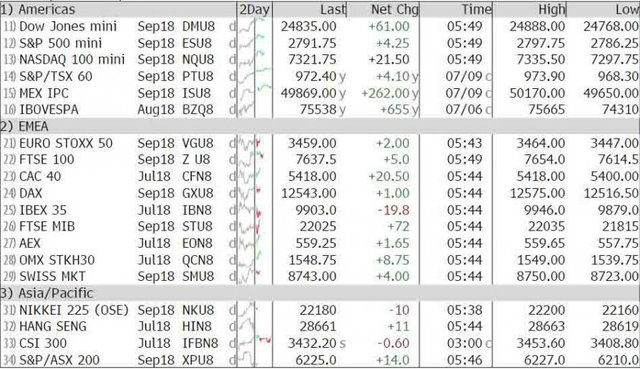
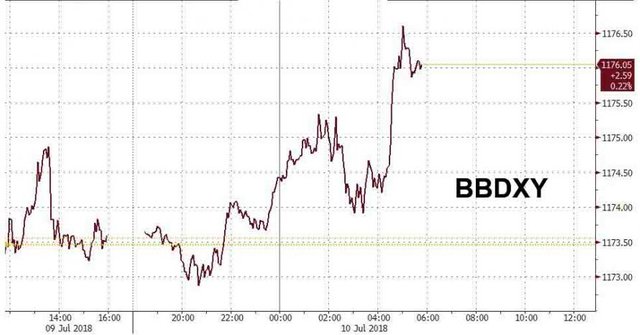
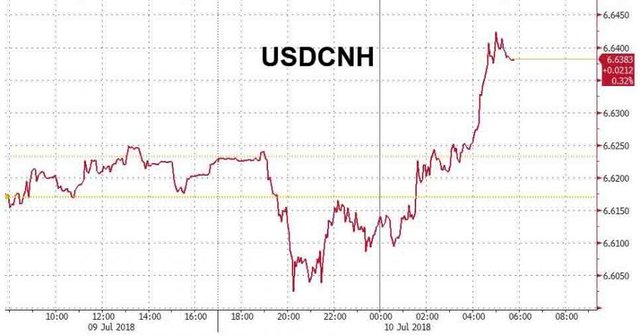
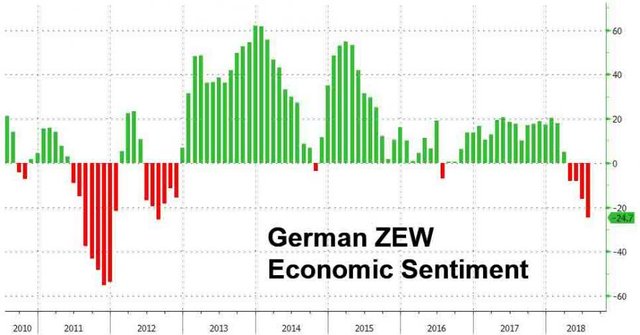
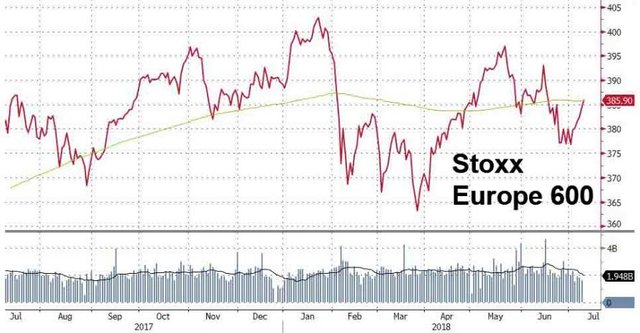
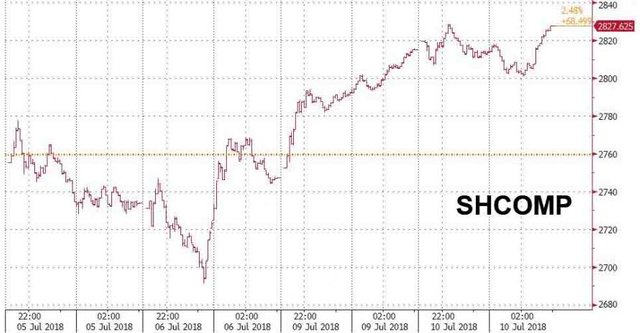
Hi! I am a robot. I just upvoted you! I found similar content that readers might be interested in:
https://www.zerohedge.com/news/2018-07-10/global-stock-rally-fizzles-dollar-jumps-german-zew-tumbles
Downvoting a post can decrease pending rewards and make it less visible. Common reasons:
Submit